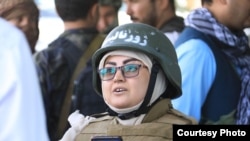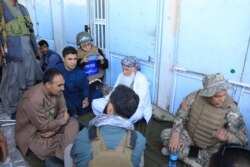In early August, Storai Karimi was reporting from the front lines in Herat, where Taliban fighters were continuing their advance across Afghanistan.
But now the journalist, who worked for the independent news agency Pajhwok, is in an undisclosed city in Pakistan after a media organization relocated her and her husband, who also works in media.
Even though she has left Afghanistan, Karimi said she still feared for her life.
"There might be some threats to my life, so I cannot go into the details," she said during a video call with VOA.
After declaring victory in the capital, Kabul, on August 15, the Taliban said they would allow media and women to work.
But journalists like Karimi, who watched as her female colleagues were banned from working and heard that roughly 200 journalists were missing, sees no reason to believe their promises.
The Taliban have ordered female journalists at state-run outlets to not come to work, and some other broadcasters have removed women from shows.
"They do not care about anyone. How they would care about the safety of journalists?" she said.
Karimi said that journalists must clearly be facing threats to feel the need to flee their homes and work.
"Journalists are not safe, and more importantly women journalists are not allowed to work in the media," she said. "These are the factors that forced journalists to leave their country. Otherwise, no one prefers to seek refuge in another country."
Fewer than 100 female journalists are still working in Kabul since the city fell, according to a survey by media watchdog Reporters Without Borders (RSF).
It is a significant drop from 2020 when Afghanistan had 108 privately owned news outlets employing 4,940 staff members. Of those, 700 were women, according to data from the media watchdog and Center for the Protection of Afghan Women Journalists.
"Women journalists must be able to resume working without being harassed as soon as possible, because it is their most basic right, because it is essential for their livelihood, and also because their absence from the media landscape would have the effect of silencing all Afghan women," RSF secretary-general Christophe Deloire said in a statement.
'Difficult operation'
Efforts to evacuate journalists at risk in Afghanistan were frenzied and complicated before U.S. and NATO forces withdrew this week.
"This is certainly, in the time that we've been doing emergency assistance, the biggest, most complicated, most difficult operation to try to support journalists who are in immediate danger of losing their lives that we've ever been involved with," said Nadine Hoffman, deputy director of the International Women's Media Foundation (IWMF).
Her organization is one of several media groups assisting in the vetting and mass relocation of hundreds of journalists.
Across the international press freedom community, thousands of requests have been received from journalists seeking to leave the country, Hoffman told VOA.
"Our focus has really been first and foremost about getting them to safety, whether that means evacuation or whether that means safe houses," she said, noting that for many journalists who are not based in Kabul, fleeing to another country is not an option.
The U.S. Agency for Global Media is still working to evacuate more than 100 staff and contractors, including journalists for VOA.
VOA Acting Director Yolanda Lopez released a statement Thursday saying the agency was doing everything it could to help those who wish to leave.
"We have been working day and night, pursuing every available option, only to hit countless obstacles and roadblocks," she wrote. "These men and women are part of our VOA family, and we will not be deterred by these setbacks."
Even those who manage to get to some semblance of safety do not feel free or at ease.
"We are moved to Pakistan, but we do not have peace of mind," Karimi said. "We are not in a good psychological state. We are still very worried."
The Taliban have support networks in parts of Pakistan, with multiple sources telling VOA previously that the group has held fundraisers in some Pakistan regions.
While journalists seek refuge, are in hiding or face threats in Afghanistan, many fear an impending blackout in areas where Taliban rule is more harsh.
"If the journalists leave Afghanistan, then nobody knows what's happening inside," Hoffman said. "But if they don't leave, they may not be left alive to actually do their reporting."
In recent weeks, journalists have reported being beaten in the street or having Taliban fighters search their homes and threaten their relatives. In at least one case, the Taliban shot a family member of a journalist for the German broadcaster Deutsche Welle.
Two journalists were also among the more than 100 killed at Kabul airport during the suicide bombing on August 26. Both had been trying to flee the country. The Islamic State's regional arm, IS-Khorasan, claimed responsibility for the attack.
Karimi also recounted tales of her coworkers being searched and harassed, with Taliban forces going door to door looking for family members.
"If a journalist does not have psychological and physical safety," she said, "they will never be able to properly fulfill their job of informing the people."
Roshan Noorzai and VOA's Afghan Service contributed to this report.










